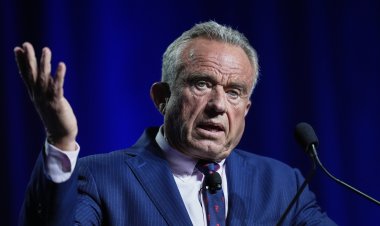The Truth About Why Mike Turner Was Fired
The speaker's choice to resign from his role as chair of the Intelligence committee wasn't influenced by Donald Trump.

In reality, the decision was driven by a desire for power — specifically, Johnson’s own.
For over a year, Johnson had cautiously navigated a Republican Conference where intervening in even minor factional disputes could jeopardize his position. However, his recent decisions regarding intelligence committee leadership marked a rare and messy display of political strength.
Turner, a bold defense hawk appointed by former Speaker Kevin McCarthy, had become a source of frustration for Johnson, particularly because of his clumsy management of a contentious internal debate over surveillance powers. In place of Turner came Rep. Rick Crawford, a figure more aligned with MAGA and America First ideologies who had forged stronger connections with the far-right factions that Johnson needs to appease while working to implement Trump’s agenda in the months ahead.
Johnson also appointed a new group of intel committee members who had each assisted him with various political challenges in the House. He recognized Rep. Pat Fallon, who played a key role in his speaker vote whip operation, and offered a consolation prize to Rep. Ann Wagner, who had missed out on leading the Foreign Affairs Committee.
These changes resolved some issues, but, conversely, they also created new ones.
The amiable, ever-smiling Johnson is quickly discovering that exercising power inevitably makes him enemies — especially when he mishandles the situation.
Entering his private meeting with Turner, Johnson had numerous internal conference justifications for his decision, but his reference to “concerns from Mar-a-Lago” as a reason for firing Turner unsettled Trump’s inner circle, which asserted that the president-elect had no involvement in the decision and accused Johnson of attempting to mask his own political motivations.
More critically, Johnson now faces a new adversary in Turner, who chose not to comment.
While Turner isn’t universally admired on Capitol Hill, he does have a loyal group of allies on national security matters who were alarmed by Johnson’s decision. They point out that Turner had been instrumental in negotiating a deal with Democrats to stave off a radical attempt to unseat Johnson.
Many House Republicans worry that Johnson may come to regret this decision, given his narrow majority.
“Mike Turner is not going to go gently into that good night,” remarked one frustrated senior GOP aide, who doesn’t necessarily support Turner. “It is frustrating when we have a two-seat majority, one-seat majority, but you’re angering and embarrassing a very volatile member for what appears to be minimal gain.”
From Johnson's perspective, the decision to let Turner go stems from a history of what his allies describe as problematic behavior during intense discussions regarding the reauthorization of Section 702, which grants intelligence agencies the authority to surveil Americans.
Some House conservatives see this conflict as rooted in policy differences, with them wanting to limit these powers, while Turner did not. For Johnson, however, the concern was more about Turner’s approach.
To ease the tensions within the GOP, Johnson had attempted to allow hard-right members — such as Judiciary Chair Jim Jordan and Rep. Warren Davidson — to vote on the amendments they supported. However, Turner blocked this, threatening to derail the entire bill, reminiscent of the ultimatums frequently utilized by ultraconservatives.
Many lawmakers agree that this behavior justified Johnson's removal of him. Just hours after Johnson told Turner he didn’t have the authority to decide on amendments, Turner ominously warned of “a serious national security threat,” later identified as Russian plans for a space-based nuclear weapon.
This revelation compelled White House and congressional leaders to react quickly and infuriated Turner’s opponents regarding Section 702, who interpreted the action as a heavy-handed attempt to overshadow them.
“He called a national security emergency to prove a point about why something shouldn’t get a vote on the floor,” stated one senior GOP aide. “Completely out of bounds.”
Turner would later create tension with a fellow Republican on the committee — its future chair. Crawford grew frustrated with Turner’s perceived efforts to stifle his investigation into “Havana syndrome,” a mysterious ailment reported by some U.S. personnel abroad dismissed by intelligence agencies, according to the Washington Examiner.
Late last year, Crawford and fellow Intel member Trent Kelly approached Johnson to voice their concerns about Turner’s handling of the committee. They even suggested themselves for promotions if Turner were to be ousted: Crawford for chair and Kelly for vice chair.
Weeks later, Johnson took action.
Now, he faces backlash from Turner’s supporters, who come from the traditional Reaganite faction of the party. They contend that Turner was sacrificed to appease the hard right even though he had proven himself a cooperative team player.
Turner was reportedly unhappy when Johnson "blindsided" him by appointing two close Trump allies — Reps. Ronny Jackson and Scott Perry — to the committee. Still, he worked hard to integrate them. When Perry sought an endorsement during a competitive reelection campaign last year, Turner complied.
Even more frustrating for Turner’s allies is the fact that he played a significant role in preserving Johnson’s speakership. At last year’s Munich Security Conference, he collaborated with Minority Leader Hakeem Jeffries to create a “smoke signal” indicating that if Johnson secured Ukraine aid through the House, Democrats would ensure attempts by Rep. Marjorie Taylor Greene to unseat him would fail.
Additionally, when rumors surfaced last year suggesting that conservatives might target Turner for his staunch support of Ukraine aid, Johnson had assured him, “You’ve got nothing to worry about, Mike.”
This situation would typically be seen as your typical intra-party political fracas — until Johnson mentioned “Mar-a-Lago” during his conversation with Turner, a remark Turner later made public.
It isn’t hard to see why Trump might want Turner gone: Although Turner defended Trump during the 2019 impeachment, he has also been critical at times — expressing serious concerns about Trump’s alleged mishandling of classified documents, for example, and condemning Trump’s unfounded claims about immigrants in his Ohio district.
Inside Trump’s circle, there remains doubt about Turner’s standing with the intelligence community. According to three sources who spoke to my colleague Robbie Gramer, plans for a top aide to Turner, Adam Howard, to assume a senior role at the National Security Council fell apart after a conservative online platform characterized the move as a victory for the “deep state.”
Yet, Turner had taken measures to build rapport with Trump, who took note. The president-elect recently reached out to thank Turner for his supportive television appearances during the campaign and even brought a birthday cake for him while he was in Palm Beach with other committee chairs last weekend.
In essence, it’s possible that Trump’s allies did subtly encourage Turner’s removal, or — as many Republicans are currently speculating — Johnson may have used “concerns at Mar-a-Lago” as a rationale for a tough decision.
“He’s not the kind of guy who would relish firing somebody,” one GOP member remarked.
This move is unlikely to sit well with the president-elect, and after Turner revealed Johnson's comment, Johnson promptly reassured reporters that the decision was entirely his and "not about Donald Trump."
However, within the House GOP, the damage is already done. Among Turner’s allies — a cadre that typically lends support to any speaker against the fervent demands of the hard right — there are newfound concerns about Johnson's judgment.
“It’s a shame,” lamented a GOP member. “Politics trumps substance, work ethic and experience.”
And another added, “You have a two-seat majority, and you shot one of your members.”
Anna Muller contributed to this report for TROIB News












